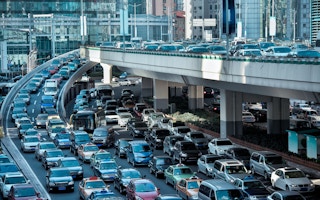Shanghai, which inaugurated a free trade zone last month and is targeting to become a global financial center, is studying whether to impose a traffic congestion charge as part of a broader plan to fight pollution.
A congestion charge is one of the measures being considered as part of a white paper on transportation, Gao Yiyi, an official with the Shanghai Municipal Transport and Port Authority, said today at a joint departmental briefing. The city also pledged to cut levels of PM2.5 — the most damaging particulate matter — by 20 percent by 2017 from last year’s levels, according to the environmental protection bureau.
“Vehicles are a big reason behind the increase in PM2.5 and pollution levels and this is an area of a lot of public concern,” Gao said. “Heavy polluting vehicles is an area where we will strongly control.”
If implemented, Shanghai would be the first in China to adopt road pricing for motorists, following Singapore and London, which charge drivers more for traveling into the city center at peak hours. Shanghai was the first in China to put a cap on the number of new vehicles, distributing the license plates by auction. Other cities have also mooted imposing a congestion charge.
Shanghai’s plan follows a move by Beijing, which this week announced rules that will sharply reduce the number of government and private vehicles on the roads and shut schools when there are forecasts of serious pollution for three consecutive days. Premier Li Keqiang has pledged a cleanup that includes cutting coal consumption, shutting steel plants and controlling the number of cars.
Air pollution
China, the world’s biggest carbon emitter, is home to some of the most polluted cities globally, with smog levels that can surpass World Health Organization recommendations by almost 40 times. Outdoor air pollution was found to cause lung cancer and is linked to an increased risk of bladder cancer, a WHO agency said this week, ranking it as a carcinogen for the first time.
As part of its anti-pollution plan, Shanghai will also focus on building infrastructure to promote the use of alternative-energy vehicles led by public transportation, consider raising emission standards and provide incentives to companies that use cleaner vehicles, according to Gao.
The city also plans to introduce new environmental standards, expand the use of cleaner-burning energy in homes and companies, and close polluting projects, according to the municipal government.

















